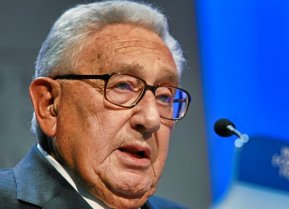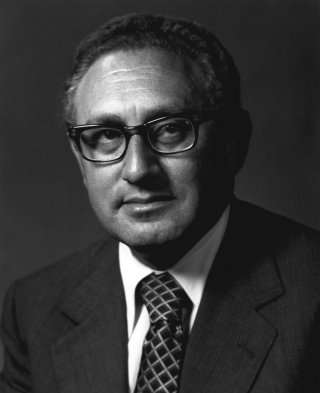Henry Kissinger Was the Right Man for the Moment
The next president might need to take more of a Kissingerian approach to the world.
I was not always a fan of Henry Kissinger, the Nixon-era Secretary of State who died on Wednesday at age 100.
As a Ronald Reagan-loving conservative who worked on democracy-promotion efforts at the State Department during the George W. Bush administration, I didn’t think much of his efforts to coexist peacefully with the “Evil Empire” Soviet Union or cut deals with communists in Vietnam and China.
Détente with Moscow looked to me as a young man like weakness, and it was a French word at that. As a Gen Xer growing up in the 80s and 90s, seeing blockbuster movies like First Blood, Full Metal Jacket, and Platoon, each seeking in its way to grasp America’s first wartime defeat in Vietnam, I wondered why we didn’t just level Hanoi. Kissinger’s spurning of non-communist Taiwan for the communist government in Beijing—at the time still run by the butcher Mao Tse-tung—struck me as a betrayal. The victory of the West in the Cold War, ushered by distinctly un-Kissingerian Reagan, Margaret Thatcher, and Pope John Paul II, proved Kissinger’s approach to be wrong in any circumstance—or so I thought.
Then, the last twenty years happened.
Don’t worry: I’m still a conservative Reagan-lover. But history has clarified that Kissinger was the essential man America needed at the time and that his realist approach to foreign affairs might once again be right for America as it fumbles through the 2020s.
Kissinger has become most associated with the opening of relations with China, but his greatest service was extricating America from combat in Vietnam. With the exception of the Gulf War, the history of post-Cold War America has been one of wars that are much easier to commence than terminate. After failing to learn this lesson in Iraq and Afghanistan, Washington is being schooled anew in the limits of its power in Ukraine. Kissinger’s feat of reaching a deal with Hanoi to get America out of Vietnam with its prisoners of war back and a decent interval before the hopeless government of South Vietnam collapsed was essential both to America’s national power and internal health. Achieving the deal required a brutal bombing campaign directed at North Vietnam and its forces in supposedly neutral Cambodia—a reminder that diplomacy is not just about finding the right combination of verbiage and inducements.
Nixon’s opening to China with Kissinger was also a masterstroke that accentuated divisions between Moscow and Beijing and laid bare the lore of a monolithic communist bloc. The importance to the United States of keeping those two powers apart has been lost on leaders of more recent decades. The threat that China subsequently has become does not diminish the essential mission in Kissinger’s time of keeping the Soviet Union off balance.
Even détente with Moscow brought with it the Helsinki Accords, which contained a contra-realpolitik human rights component that elevated governance and captive-nations issues.
Kissinger didn’t run foreign policy during peaks of American power in years like 1945 or 1991. He became national security advisor in 1969 and Secretary of State in 1973. His tenure followed a decade of chaos in America unseen since the Civil War. The series of energy and financial crises that included the Nixon Shock and the First Arab Oil Embargo occurred during his tenure. America’s allies and its own citizens sensed decline.
Unfortunately, the United States again finds itself in such a situation of decay. Its military cannot win wars. Its indebted government is headed toward an eventual financial crisis. Some economists praise the economy, but average Americans express overwhelming disapproval to pollsters.
America will eventually recover once voters force change. But before that recovery, the country must make tough choices. With persistent annual deficits near $2 trillion, it can no longer afford to spend whatever it likes. It cannot underwrite Europe’s security, fight a proxy war of attrition with Russia, garrison Iraq and Syria, and deter China at the same time. The economic picture is mixed at best, and political and fiscal realities will likely lead to smaller military budgets regardless of which party runs Washington.
The next president might need to take more of a Kissingerian approach to the world. He could also use a smooth bureaucratic operator to run statecraft. I was recently reminded of Kissinger’s prowess with what some call “the Deep State” when I came across a conversation between him and Singaporean leader Lee Kuan Yew as Southeast Asia neared the peak of crisis in 1973. He established a private channel with Lee, cutting out the State Department and military, remarking: “I will designate some intelligence man who will have a direct channel to you.” As the conversation ended, Kissinger put Lee’s mind at ease regarding the risk of leaks that would imperil Lee politically, parting with: “There is never a leak here. My staff may be incompetent, but they are loyal. Even our ambassador will not know.”
The man knew his business.
Christian Whiton was a State Department senior advisor during the George W. Bush and Trump administrations. He is a senior fellow at the Center for the National Interest.
All images are Creative Commons.


